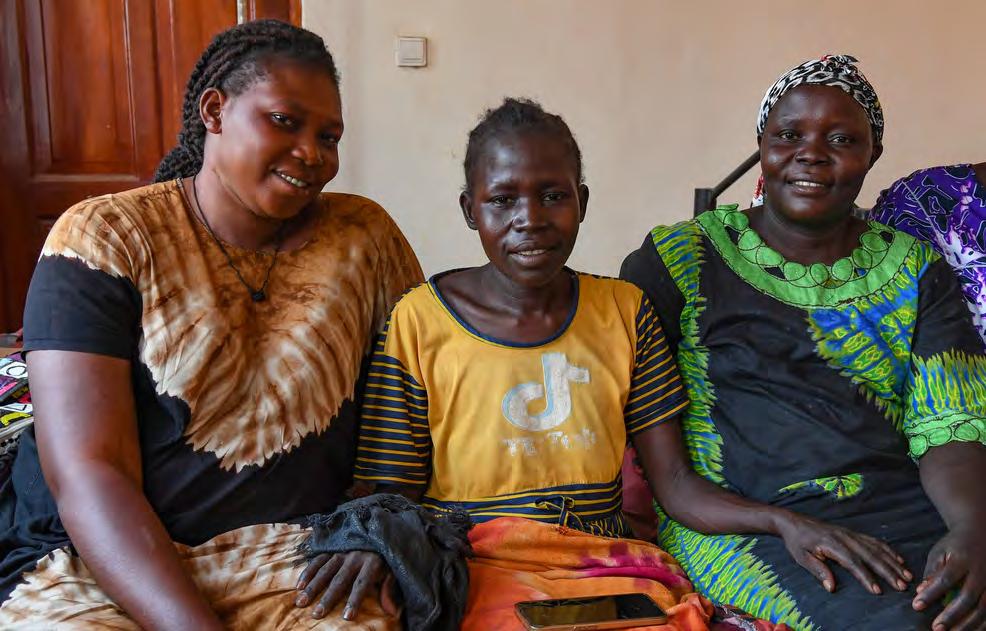
7 minute read
MUM INSPIRES OTHERS AFTER BEATING FISTULA
In February and March, MAF partnered with the Reconciliation Hospital in Hai Referendum to fly fistula patients to Juba for surgery. 30-year-old Tensa, the mother of eight, with six living children, shares her story to encourage other women to seek out help.
In the pre-op ward, Tensa is waiting to receive expert care. Tensa’s story is tinged with sadness and hope. The thirty-year old mother developed a fistula birthing her eighth child, in her rural community in October last year. Too far from hospital she had no choice but to deliver at home.
‘I stayed for three days in labour. The baby wanted to come out, but it was too big. I sat down and when I tried to get up, I found that my legs were paralysed. I couldn’t stand by myself.
‘ We couldn’t get transport to the hospital. My legs were paralysed so I could not walk. I had to be carried. We finally got a car I was put in the car and taken to hospital but when we got there the baby was already dead in my stomach.
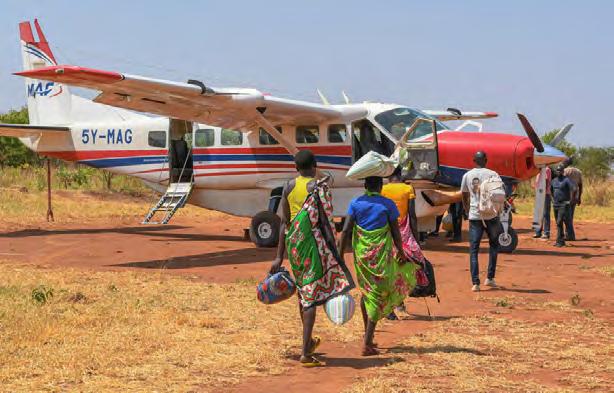
Tensa was taken for surgery as soon as she arrived. The baby was delivered and taken away to be buried.
Her ordeal was far from over.
After three days in hospital the doctors began to notice a smell. Tensa was taken again for second surgery – at which time a catheter was fitted. She was then transferred to a different hospital where she could receive more advanced care and removed her catheter.
‘ That’s when I realised there is leakage. The urine started flowing uncontrollably.’
‘I had so many thoughts. “My legs are paralysed, and urine is leaking uncontrollably. What am I going to do? Whenever I ate anything I would vomit – I thought, “My by body is finished.”
‘My husband’s family supported me and people in my community raised money to get hibiscus flowers so they could bring me tea.’
‘I wondered, “What will happen to my children? Their father cannot take care of them by himself without me”.’
The missionary doctors at the second hospital realised that Tensa needed the care of specialist fistula surgeon Dr Andrew Browning who visits Juba three times a year. They referred Tensa to the ELCMSS’ Reconciliation Hospital in Juba and made arrangements for her to fly there with MAF.
It wasn’t easy for Tensa to travel so far and leave her children behind.
‘I left my children in the Nuba Mountains. I came to Juba with other women who were the ones I was staying with in the hospital in Nuba,’ she says.
Despite the challenges, Tensa has a smile on her face as she was helped to disembark by the MAF team at Juba International Airport as one of 43 patients to receive fistula repair surgery at the February outreach.
‘It was coming close to surgery day when I started feeling chills in the night. The ELCMSS medical staff tried to make me feel warm but to no avail. The day of her operation came.
‘ They took me to the operating table but when the doctor touched me, he found that my body was very hot. They postponed the operation and tested me Malaria and typhoid and found that I was suffering with typhoid.’
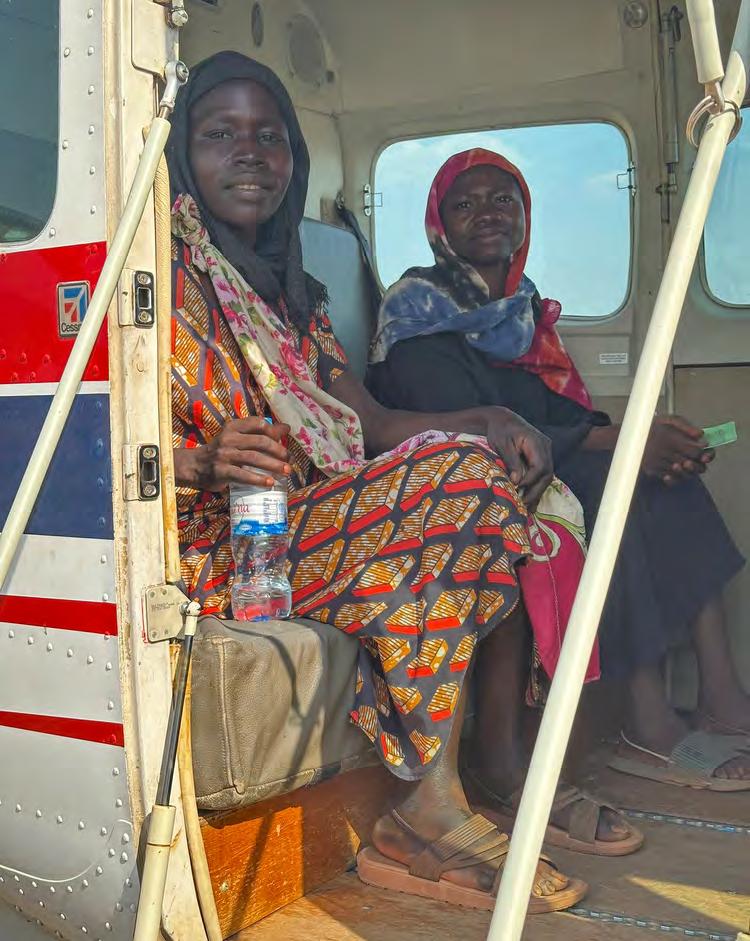
Onc e Tensa recovered from Typhoid, she was taken for surgery again. This time the operation was successful. Tensa was finally on the road to recovery after a traumatic ordeal.
‘ The doctor treated me, and I am very happy.’
‘One of my legs is better, but the other is still numb although it has improved from before when my foot would just drop, and I had to be carried like a small child. Now, I can move around with my walker.’
She is thankful f or the role played by ELCMSS staff, the doctors and medical staff, and also to MAF.
‘I give all the thanks to God. I thank God and I thank the doctors. I thank the people who brought me to the doctors.’
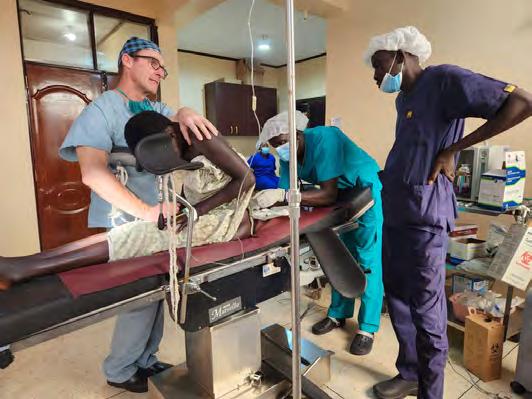
Her story doesn’t end there.
The pain ful experience became unexpectedly joyful for Tensa for another reason. When she left her home in Western Equatoria, eight years ago, to marry a man from the north, it was the last time she saw her family. They had completely lost touch. On hearing of the separation, ELCMSS staff member Benjamin embarked on a mission to reunite the family. He took a photo of Tensa and sent it to some people in her community. The photo was forwarded until it reached her siblings living in Juba.
A few days before her surgery, a joyful reunion took place with three sisters, a brother and a niece, crowding around Tensa’ bed. If she hadn’t flown on the MAF plane to Juba for surgery – the happy reconnection may never have taken place with family she last saw eight years ago.
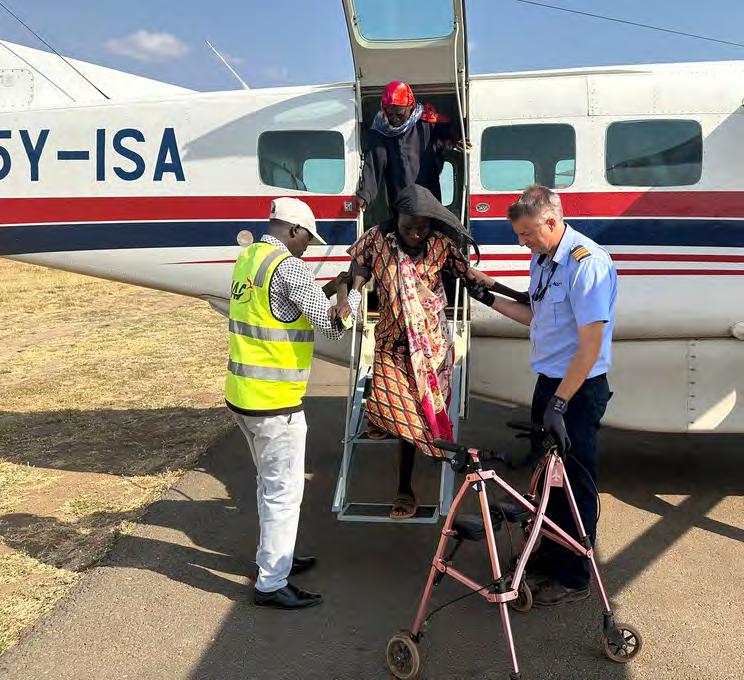
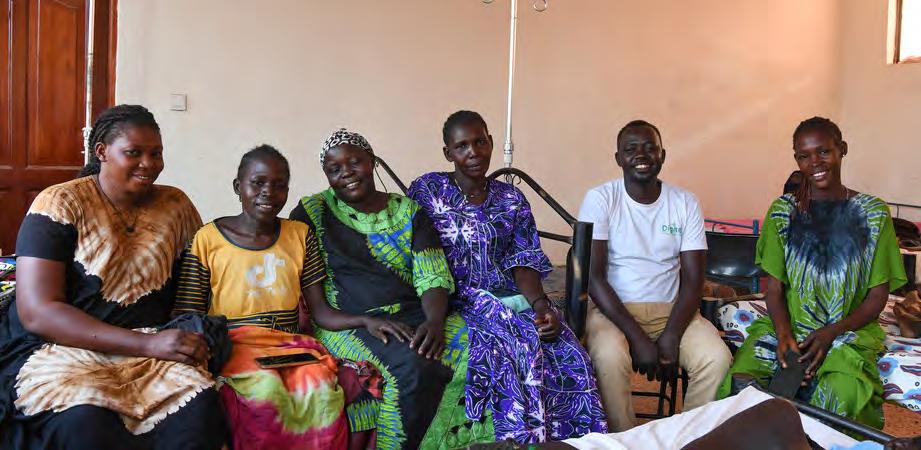
Tensa is delighted to have the support of her family. ‘If not for Benjamin, I would not have met with my family. I thank God for this!’
At the other end of her ordeal, Tensa counsels’ other women living with a fistula to be brave and seek help.
‘ The people who are sick like me should not be afraid. Let them come. Don’t fear, saying “I don’t have food,” or “I don’t have money.” The hospital staff give us food, and we eat, and we drink. They should not fear because they will be treated, and they will go back home happy. The doctors are good. Nobody will die here. You will be fixed, then you can go back to your children. Do not be afraid at all. This is my advice to people who are sick and afraid. Let them not be afraid.’


‘I am inspired by Tensa’s resourcefulness. Tensa went to a distant land, another country, and the connection to her homeland was broken. When she came to Juba, she didn’t even have a smartphone, but she was bold to ask for help. The Lutheran Center staff were resourceful to use social media to find people online from her home area, and that resourcefulness made the reunion happen so quickly. God uses His people to make miracles happen in the lives of others. That’s what happened in the chain of events that reunited Tensa and her siblings.’
—
Daudi Msseemmaa, Regional Representative for East Africa
‘I didn’t understand the reality facing women living with fistula until I visited the ELCAMSS hospital and saw the work firsthand. In Sweden, no woman would have to live with this condition. In South Sudan, there could be as many as 60,000 women living with the stigma and heartbreak of this condition. The need is huge. Nevertheless, I am proud that MAF can play a small part - helping one woman at a time.’
— Josefin Brandstrom, MAF Country Director, South Sudan
‘Fistula repair surgeries are a way to serve women from rural communities who live with physical and psychological side effects of fistulasometimes for years. MAF brings them to Juba to receive surgery and nursing care at the ELCAMSS Reconciliation hospital. It is a privilege to support such lifechanging work with our flights.’
— Gerbrand Reijnoudt, MAF Pilot
‘It is our privilege to partner with ELCAMSS Reconciliation hospital in bringing hope to women living with childbirth injuries in South Sudan. As missions, we are aligning our Christian visions to transform the lives of some of the most vulnerable people in South Sudan. Our generous MAF supporters allow us to continue to support this life changing work.
— Jaap de With, MAF Partnership Development Manager

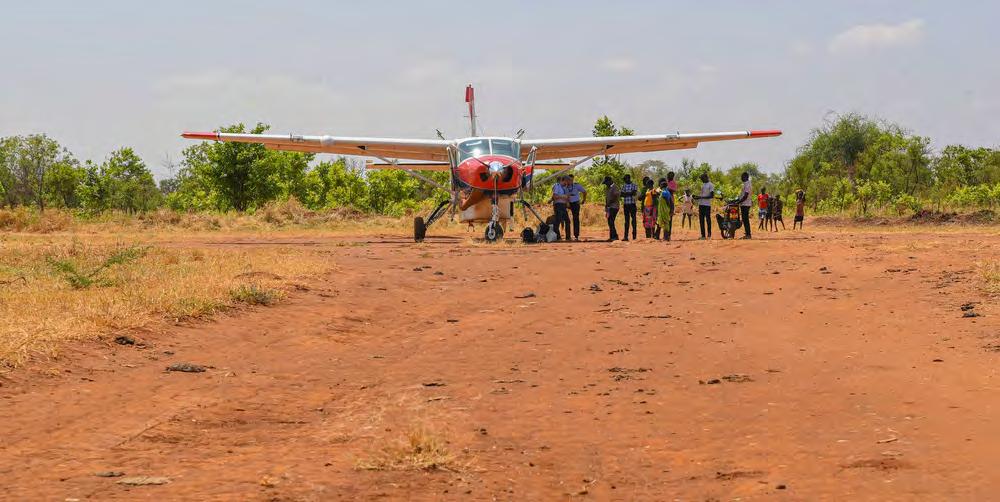
SOUTH SUDAN | STORY BY JENNY DAVIES CULTURAL SENSTIVITY: AS A CONDITION EFFECTING WOMEN, FISTULA IS A TABOO SUBJECT IN SOUTH SUDAN. SOME PHOTOS HAVE BEEN REMOVED FROM PATIENTS FROM OTHER LOCATIONS AT THEIR REQUEST.






